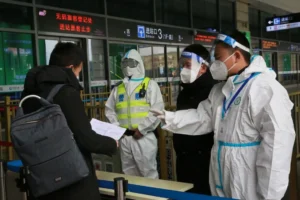
A two-stage coronavirus lockdown in the financial hub of Shanghai is raising fears among foreign investors that China will stick to its zero-Covid strategy longer than first thought, while putting pressure on businesses and making the country one of the last in the world to emerge from the pandemic.
The snap decision, which comes only days after city authorities rejected calls for a lockdown, has caught many foreign firms headquartered in the city of 25 million people by surprise.
“While the majority of G20 countries are exiting pandemic-related lockdowns, China appears to be stuck with its old toolbox of zero tolerance and draconian measures to fight Covid,” said Jorg Wuttke, president of the European Union Chamber of Commerce in China (EUCCC).
“We fear that we may be about to witness the beginning of an Omicron crisis across China.”
The city, which contributed 3.8 per cent of the nation’s gross domestic product last year, reported 3,500 new infections, including 3,450 asymptomatic ones, on Sunday.
Shanghai announced late on Sunday it was implementing a staggered eight-day lockdown, which follows a week-long lockdown in the tech hub Shenzhen, home to Huawei Technologies Co., Tencent, drone maker DJI and Apple supplier Foxconn.
Shanghai’s lockdown underscores how intently Chinese authorities are sticking to their “dynamic zero-Covid” policy, which involves stamping out local outbreaks with strict preventive measures, while much of the rest of the world is shifting to live with the virus.
The lockdown will have significant ramifications on the service sector, but the European chamber of commerce pointed out that supply chains will also be disrupted as essential workers are quarantined or key materials are unable to be delivered.
Wuttke said unemployment might spike in the service sector, though the manufacturing sector should be able to handle the lockdowns better “as some have already established production rosters, whereby operational staff remain on factory grounds for up to seven days, before a new team takes over”.
“In addition to the strain on business, the population seems less willing to put up with lock downs, as more and more erratic local policies erode citizens’ confidence in their local administrations,” he told the South China Morning Post.
Bettina Schoen, chair of EUCCC’s Shanghai chapter, said it was a terrible situation with all kinds of uncertainty, as production capacity at many European firms was limited and it was only possible to plan on a daily basis.
The latest outbreak has spread to 28 provinces and regions across China and authorities’ rigid response is adding to fears about an economic slowdown in the world’s No 2 economy.
“Spreading Omicron infections are testing the sustainability of this policy. The possibility of rapid transmission of Omicron in China is a key risk to its economy,” Louis Kuijs, chief Asia-Pacific economist at S&P, wrote in a note on Monday.
The concerns of foreign businesses are being echoed by Chinese companies too, particularly small ones. While that has failed to change pandemic control policies, it has led to more government relief measures, including off-budget spending on infrastructure construction and plans for a 2.5 trillion yuan (US$3.92 billion) tax cut.
“Instead of seeing thousands of people queuing for tests on a near daily basis, it would be preferable to see lines of people getting a booster shot capable of dealing with the Omicron variant,” said Wuttke.
“Existing mRNA vaccines seem the best option, so it remains a mystery as to why China has not pursued this strategy, particularly given that Fosun and BioNTech already agreed cooperation in spring 2020, and established a factory in Shanghai later that year.
“While China achieved great success with nearly zero cases over the last two years, it has not been dynamic enough in adjusting to the new variant, instead waiting either for the world to become zero-Covid or until their own vaccine becomes available.”
Sources: SouthChinaMorningPost